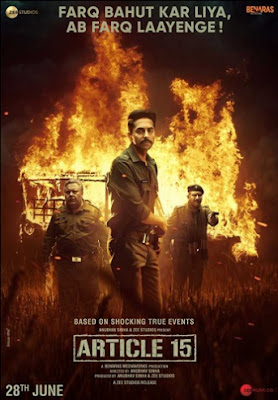Article 15 movie review rating: Three and half stars out of five
Article 15 of the Indian Constitution directs us to treat all human beings equally, irrespective of their birthplace, gender, caste, religion and race.
Caste prejudice in India is taken for granted. As a character in Article 15 (Director Anubhav Sinha’s follow-up to the superb, compassionate Mulk) mentions, we have always had separate dishes for the servants at home.
Aren’t we all prejudiced in urban India? If a driver, painter, plumber or garbage picker happens to be at our home, we watch over them as if they were thieves. We have never considered these ‘other’ people as equals. Sinha raises many such issues (one too many issues and threads in a 140-min movie) while speaking from the heart in Article 15.
Article 15 story
In this crime-drama thriller, Assistant Commissioner Ayan Ranjan (Ayushmann Khurrana) is posted at Laalganj, UP – an authoritative reaction to him conversing casually with a minister. Ranjan is immediately immersed in investigating a shocking gangrape, murder and hanging of two minor ‘lower caste’ girls, with another girl still missing.
Brahmadatt (Manoj Pahwa) and Jatav (Kumud Mishra) are reluctant police officers among others, who are eager to brush aside the case. A Europe-educated Ranjan is oblivious to this side of India. Shaken with the cruelty of the crime, his relentless search for the truth is not without consequences.
Relevant and never heavy
Sinha and Gaurav Solanki’s writing shines in making this a consistently contemporary telling, laced with sharp wit and surprising humour. How bumbling police officers interact with each other is funny at times, the part where Ranjan questions the multi-layered caste system is a huge LOL moment, as is a part about speaking in one language.
Article 15 performances, etc.
Ayushmann does much of the heavy lifting here and nails the part of an uncompromising, righteous police officer. He proves his potential for gritty drama. Manoj Pahwa and Kumud Mishra are brilliant in their roles, as is Sayani Gupta.
Mohammed Zeeshan Ayyub’s brief role as a Dalit leader is memorable, one that ends with a moustache twirl attributed to legendary Indian revolutionary Chandrashekhar Azad. Isha Talwar as Aditi, Ranjan’s longtime girlfriend is good too. Veteran actor Nassar as Panicker, a corrupt CBI officer is first-rate.
Ewan Mulligan’s fog-inspired cinematography is impressive as is Mangesh Dhakde’s varied background score (especially the main guitar theme, unusual for a thriller).
What works and what doesn’t?
We get a long look at Article 15 of the constitution before the interval, with a not-so-subtle rendering of Vande Mataram in the background. There is a little chip in about caste and country at the end that is too obvious and in-your-face.
Article 15 doesn’t have a knockout punch (like Mulk did in Tapsee’s court monologue) because of its message-prone tone. The Bob Dylan song Blowing in the Wind ends up as a hit-and-miss background in the opening scenes. But these are minor off-track elements in a largely well-informed, balanced, from-the-heart drama.
The sliced midway Ranjan-Aditi interactions have their thought-provoking moments. Ranjan’s character is nicely etched, edging him away from the usual Bollywood hero-persona, but also making him simplistic at times. Songs have been clipped away, a wise decision. The rich quality of writing and subtext stands out in every scene.
Article 15 review
The courage to say it like it is in cinema is a bonfire that lights up Anubhav Sinha’s Article 15.Do not miss Article 15 on the big screen. Sinha holds a bold, unblinking mirror to today’s India like few Indian filmmakers do in these repressed, subdued times.
Equally good caste-based movies worth watching are Sairat, the beautiful Marathi drama-romance by Nagraj Manjule and the hard-hitting Tamil drama Pariyerum Perumal BA.BL directed with great conviction and maturity by Mari Selvaraj.
